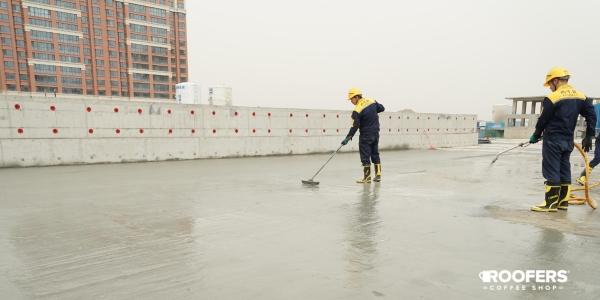PVC Performance for Flat and Low-Slope Roofs

By IB Roof Systems.
Reduced construction costs and greater energy efficiency are two of the greatest benefits of flat and low-slope roofs.
Roofing contractors working in new construction should consider talking to their general contractors, architects and home builders about the reduced construction costs and greater energy efficiency of low-slope roofs. These types of roofs are a viable option for builders and property owners who are looking for a durable, environmentally friendly, and effective barrier against the elements.
Limitations in more traditional building materials meant that years ago this design could only be implemented in warmer, arid climates. Due to reduced drainage capacity, rain posed a challenge for these systems, so regions that experienced any measure of precipitation were out of the question for low-slope roofing. Expansion and contraction of construction materials during the freeze thaw process was a significant obstacle, posing an even greater barrier for northern regions.
Nonetheless, the overall advantages, especially in the commercial setting, incentivized the effort to solve problems associated with flat and low-slope roofs in North America. Advancements in construction materials and methods have addressed the problems with leaking, meanwhile, the greater efficiency and lower construction costs make this a solid choice for contractors and property owners alike. Today the biggest decision around the construction and design of flat roofs is in choosing the optimal roofing material type; PVC (polyvinyl chloride) and TPO (thermoplastic polyolefin) lead the flat roofing market.
As a general construction material PVC is valued for its, density, flexibility, longer life, relatively low cost, and high tensile strength. As a thermoplastic material, it does not degrade between melting point and cool down. This thermoplastic quality enables the heat-welded seams to provide the highest quality performance and leak-free option. Additionally, PVC is highly resistant to environmental degradation with long-lasting, non-toxic, and non-flammable performance. It is an excellent choice for restaurant use – fats, grease and other industrial chemicals do not harm or effect PVC performance like they do TPO or even other lower quality PVC membranes. Understanding the difference between PVC formulations and thickness, shows that roofing systems like IB Roof Systems understand the best formulations and manufacturing techniques to create high-performance products.
IB Roof Systems PVC membranes are ideally suited for both commercial and residential building projects. The initial cost of installing a PVC roof is greater than a TPO roof, but not by much depending on the roof assembly or expertise of the roofing contractor. The cost of maintenance and repairs over the years means that ultimately you might spend just as much money on a TPO roof, for an inferior product. Performance-based contractors are finding that building owners are seeing lower overall costs in maintenance and repairs when utilizing PVC roofing systems.
TPO is not a sustainable white roof due to the need for ongoing cleaning. A dirty roof does not provide sustainable reflection of solar heat. This can lead to higher utility costs for building owners. Greater rigidity makes it more difficult for contractors to install, repair or maintain and can also lead to problems with weathertightness, which can be due to limited weldability. Finally, TPO is not flame-resistant like most PVC, and with current formulations it does not have the same overall durability.
PVC single-ply membrane roofs continue to outperform other low-slope roofing systems and in particular show a greater durability, sustainability and overall protection when compared to TPO roofing systems. For homeowners, building owners, architects and construction specifiers, PVC continues to show high-quality and durability in long-term performance case studies and research for flat and low-slope architecture. This makes flat roofing an option in every region and weather.
Learn more about IB Roof in their RCS directory.
About IB Roof Systems
Since 1978, IB Roof Systems has been a nationwide leader in providing high-performance PVC membranes and systems for the commercial and residential industry. The company is headquartered in Irving, Texas and has facilities across the U.S. in Springfield, Oregon, Las Vegas, Nevada, and Chicago, Illinois to serve contractors in any location. Learn more at www.ibroof.com.























Comments
Leave a Reply
Have an account? Login to leave a comment!
Sign In